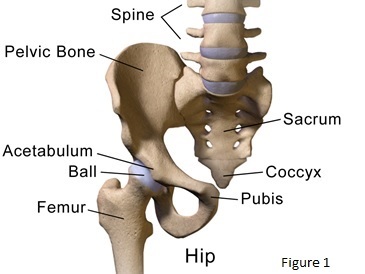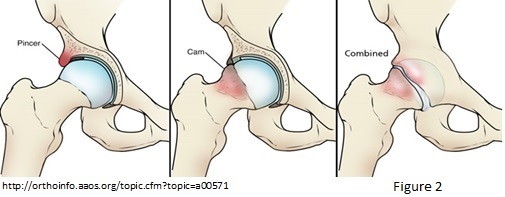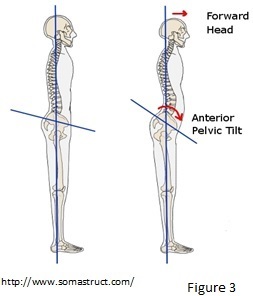March 14, 2017
What is Femoroacetabular Impingement (FAI)
Femoroacetabular impingement (FAI) is when part of the femoral head (thigh bone) bumps into the acetabulum (hip bone) typically when the hip is flexed. The impingement can be felt as a pain, a tightness or a jamming in the front of your hip socket as you bring your knee towards your chest. This can occur if you lift your leg off the ground and raise your knee towards your chest or if you perform a squatting, lunging or bending motion that reduces the angle between your hips and your thigh. One of the common activities we do daily that causes hip flexion is sitting. If you feel anterior hip/groin pain when you sit, it may be due to FAI.
What causes FAI
FAI is caused from an abnormality in the bony structures of our acetabulum and femur. There are two bony structural abnormalities that lead to FAI, a pincer lesion and a cam lesion. A pincer lesion (figure 2) is caused by the rim of the acetabulum growing out over the ball of the femoral head. This can lead to pinching of the labrum, a soft tissue lining of the joint, as the two bones come closer together during movement. This pinching can cause irritation, swelling and pain if the labrum or boney structures are damages. A cam lesion (figure 2) is caused by excessive boney growth on the neck of the femur. This can also lead to pinching of the labrum and subsequent damage. There are also cases of having both a pincher and cam lesion, which as you guessed, would lead to increased impingement. This video illustrates both lesions and how they can affect the joint: Femoroacetabular Impingement.
How can Portland Physical Therapy Help?
If you have anterior hip pain with hip flexion and/or internal rotation (rolling the thigh/leg in so the foot points in) you may be dealing with FAI. Postural changes to how we stand and sit can make FAI worse, and this is one of the key components we look for at Portland Physical Therapy. When examining our patients, we look for excessive anterior pelvic tilt (figure 3). If the hips are tilted anteriorly, this reduces the angle between our acetabulum and femur, which can lead to earlier impingement with activities. We also look for causes of the anterior pelvic tilt, which could include weak core and gluteal musculature, as well as tight/tonic hip flexors and erector spinae. We address all these issues, as well as activity modification. We teach our patients how to move correctly with subtle changes to reduce their likelihood of impinging in the hip.
If you feel you or someone you know is dealing with FAI or just general hip pain and have questions, please do not hesitate to contact our office at info@pptmaine.com or 207-828-4455 for more information. Our skilled physical therapist will be happy to discuss your symptoms and make a recommendation to help.


